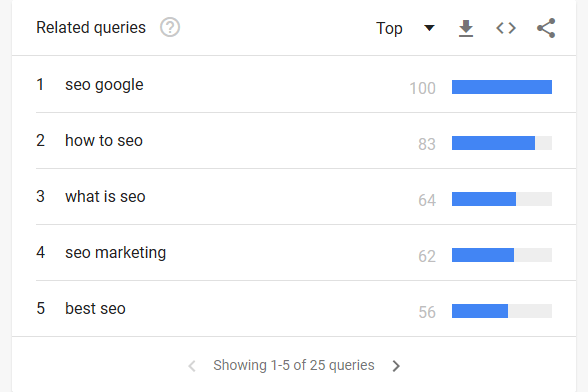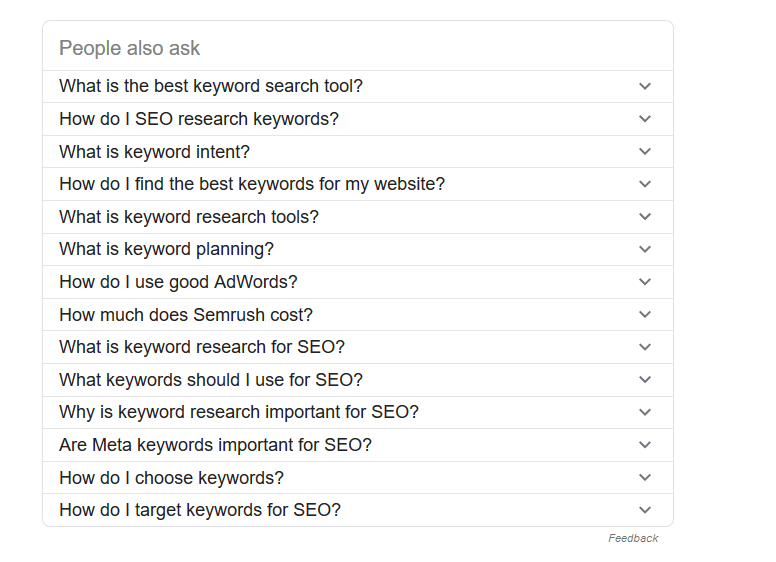
SEO Keyword Research Strategies to Improve Website Rankings
The world of search marketing and optimization is changing every day. So we wanted to pull together our opinions on trends, tactics and strategies for SEO keyword research in 2020.
Let’s start with what I call Evergreen strategies. Processes that will most likely never get old or outdated and have stood the test of time.
What is Keyword Research?
Every quality search optimization and marketing campaign needs to start with an in-depth keyword SEO analysis session. Start with what you believe is the top keyword for the service or product you are trying to rank. This would be the head or primary keyword.
In our case, we are trying to rank for SEO related keywords. We would start with the primary or seed keyword “SEO”. If you are a plumber, you might start searching “plumber” or “plumbing services”. Our goal is finding all the related keywords searches to our main topic.
What is your seed keyword or phrase?
What do you need for Keyword Research?
Its pretty basic and simple. Here are the items you’ll need to perform a proper keyword research strategy session:
- 30 minutes of time
- Internet connection and a browser
- Excel or Google Sheet
Really? Yes, it is that simple. Now let’s get to work.
Google Trends
I start my keyword research with Google Trends.
- Type in your primary keyword into the search bar on the Google Trends page.
- Select the location of the search traffic. It defaults to worldwide. I refine to United States.
- Pick the time frame. i usually leave on past 12 months, but for local or low volume trends I increase to 5 years
- Scroll down to the bottom right section of the results. You will see a box for related queries.
- It defaults to rising, but I usually choose top.
- Related queries are the first batch of keywords you want to grab. There are 25 suggestions.
- You should use the option to download to csv file.

Google’s Related Searches
Next I’ll use a regular Google.com search. I noticed one related keyword in trends was “seo services“. I’ll start with that term. Just perform a normal search in Google and as you type, notice the suggested terms google gives you.
Google gives you suggested or related terms dropping down below your search. Make note, and type them into the csv file from your trends research.
Perform the search, then scroll to the bottom of the google results page. You will notice “searches related to…” Copy these suggested terms into your sheet as well.
Repeat this process by clicking on some of the suggested topics/keyword phrases. These suggestions are great for new page ideas, but most importantly blog content ideas to write about as supporting pages for your main keywords. I selected “seo services for small business” and here are the continued suggestions.
Continue to extend the search terms and gather more phrases. Populate your keyword spreadsheet with all the data you want to load in it.
People Also Ask
Have you noticed half way down in the Google search results a section call “People also ask”? This is an amazing resources for picking out other related topics to your main search. Save these as potential blog posts to support your main pages. My search was “keyword research” and they suggested that people also ask the questions below.
Pro tip: If you expand one of the topics and collapse it, Google will give you more related questions people ask. keep doing this until they start to become irrelevant.

Keyword Research Tools
I use a few other services to enhance this process and hopefully generate dozens or hundreds of possible keyword phrases. These are free:
Google Adwords Keyword Planner – You will need a Google ads account to use this one.
Google Search Console – set up search console on your website and see which keywords you already rank for and figure out how to optimize for better position.
I love using a website called Answer the Public. It helps me find topics to use for supporting blog posts which related but don’t always compete with the main keywords.
Adding Local Relevance to Your Keywords
Most reading this might be a local business serving either a physical location or service area radius. So you will need to add a geographic modifier to your keywords. This is as easy as Keyword + City or City + Keyword. For example, Plumber Los Angeles. Los Angeles Plumbing Services.
Why is keyword research important for SEO?
The old saying applies here, “People don’t plan to fail, they fail to plan”. Just like all things in life, you need to take some time up front to plan a strategy for the execution of tactics. Keyword research is the foundation of great SEO work. Your competition is smarter every year and they are making better content, so you have to make yours better than theirs. Do this by including all related and relevant search terms in your content. Answer all the questions a reader might have about the topic, service, product you are trying to rank. Establish your website as an authority in your niche.
Also see our article on How long does it take for SEO to work?



Sorry, the comment form is closed at this time.